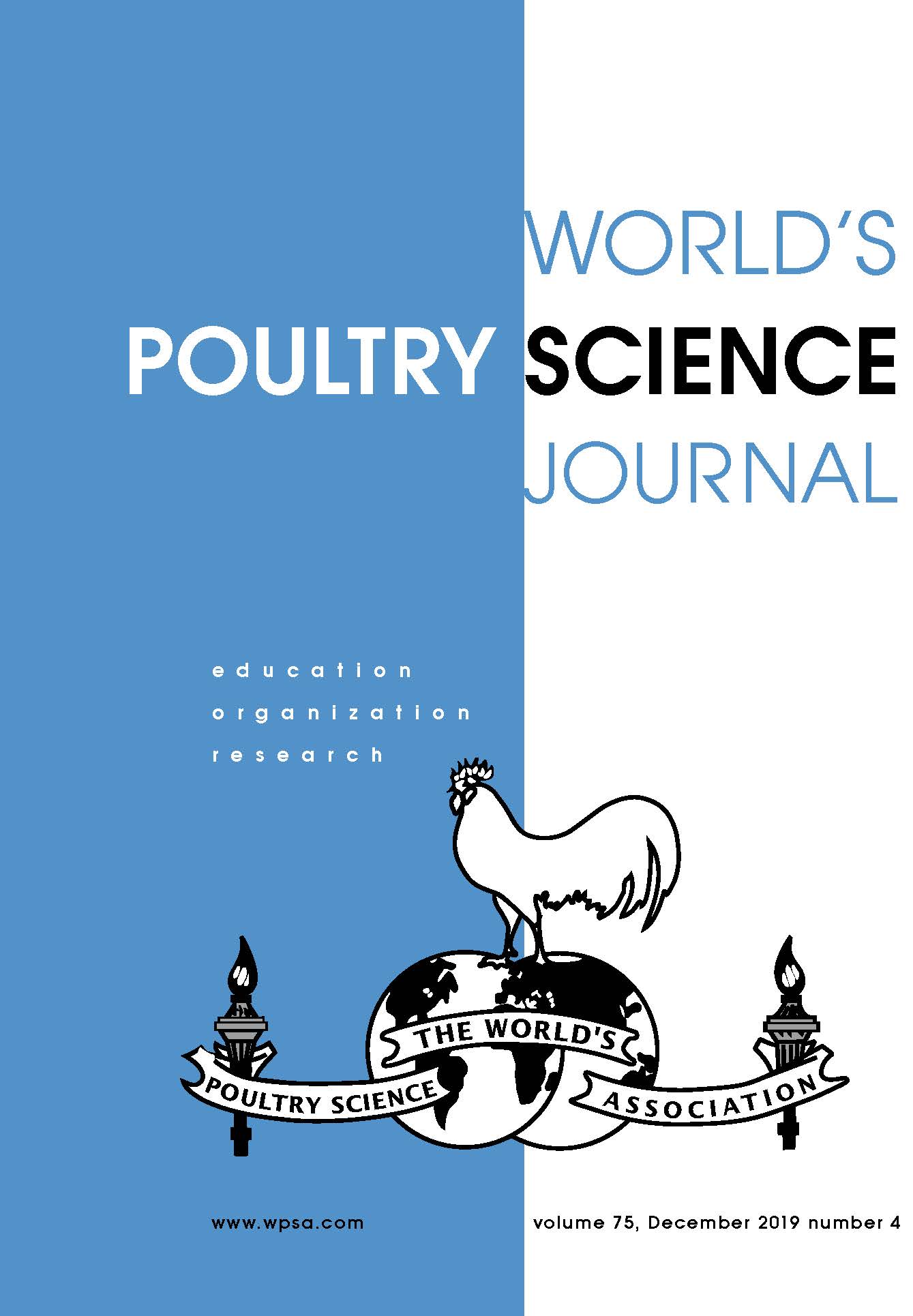Crossref Citations
This article has been cited by the following publications. This list is generated based on data provided by
Crossref.
Buitenhuis, A.J.
and
Kjaer, J.B.
2008.
Long term selection for reduced or increased pecking behaviour in laying hens.
World's Poultry Science Journal,
Vol. 64,
Issue. 4,
p.
477.
Cheng, H.-W.
2010.
Breeding of tomorrow’s chickens to improve well-being.
Poultry Science,
Vol. 89,
Issue. 4,
p.
805.
Thompson, Paul B.
2010.
Animal Ethics and Public Expectations: The North American Outlook.
Journal of Veterinary Medical Education,
Vol. 37,
Issue. 1,
p.
13.
Dennis, R.L.
and
Cheng, H.W.
2011.
The dopaminergic system and aggression in laying hens.
Poultry Science,
Vol. 90,
Issue. 11,
p.
2440.
Dennis, R.L.
and
Cheng, H.W.
2012.
Effects of selective serotonin antagonism on central neurotransmission.
Poultry Science,
Vol. 91,
Issue. 4,
p.
817.
Felver-Gant, J.N.
Mack, L.A.
Dennis, R.L.
Eicher, S.D.
and
Cheng, H.W.
2012.
Genetic variations alter physiological responses following heat stress in 2 strains of laying hens.
Poultry Science,
Vol. 91,
Issue. 7,
p.
1542.
Garamszegi, László Z.
Mueller, Jakob C.
Markó, Gábor
Szász, Eszter
Zsebők, Sándor
Herczeg, Gábor
Eens, Marcel
and
Török, János
2014.
The relationship betweenDRD4polymorphisms and phenotypic correlations of behaviors in the collared flycatcher.
Ecology and Evolution,
Vol. 4,
Issue. 8,
p.
1466.
Muir, William M.
and
Cheng, Heng Wei
2014.
Genetics and the Behavior of Domestic Animals.
p.
463.
Muir, William M.
and
Cheng, Heng Wei
2014.
Genetics and the Behavior of Domestic Animals.
p.
317.
Kops, Marjolein S.
Kjaer, Joergen B.
Güntürkün, Onur
Westphal, Koen G.C.
Korte-Bouws, Gerdien A.H.
Olivier, Berend
Bolhuis, J. Elizabeth
and
Korte, S. Mechiel
2014.
Serotonin release in the caudal nidopallium of adult laying hens genetically selected for high and low feather pecking behavior: An in vivo microdialysis study.
Behavioural Brain Research,
Vol. 268,
Issue. ,
p.
81.
Dennis, Rachel Lynn
and
Cheng, Heng-Wei
2014.
Differential serotonergic mediation of aggression in roosters bred for resistance and susceptibility to Marek’s disease.
British Poultry Science,
Vol. 55,
Issue. 1,
p.
13.
Fallahsharoudi, Amir
de Kock, Neil
Johnsson, Martin
Ubhayasekera, S. J. Kumari A.
Bergquist, Jonas
Wright, Dominic
and
Jensen, Per
2015.
Domestication Effects on Stress Induced Steroid Secretion and Adrenal Gene Expression in Chickens.
Scientific Reports,
Vol. 5,
Issue. 1,
Camerlink, Irene
Ursinus, Winanda W.
Bijma, Piter
Kemp, Bas
and
Bolhuis, J. Elizabeth
2015.
Indirect Genetic Effects for Growth Rate in Domestic Pigs Alter Aggressive and Manipulative Biting Behaviour.
Behavior Genetics,
Vol. 45,
Issue. 1,
p.
117.
Dennis, R.L.
2016.
Adrenergic and noradrenergic regulation of poultry behavior and production.
Domestic Animal Endocrinology,
Vol. 56,
Issue. ,
p.
S94.
Vieira Filho, JA
Garcia, EA
Oba, E
Santos, TA
Molino, AB
Silva, AP
Pelícia, K
and
Paz, ICLA
2018.
Production Indicators and Levels of Corticosterone in Pullets Treated with Beak-Trimming Protocols.
Revista Brasileira de Ciência Avícola,
Vol. 20,
Issue. 1,
p.
63.
Huang, Xiaohong
Kuang, Shihuan
Applegate, Todd J.
Lin, Tsang-long
and
Cheng, Heng-wei
2019.
The development of the serotonergic and dopaminergic systems during chicken mid-late embryogenesis.
Molecular and Cellular Endocrinology,
Vol. 493,
Issue. ,
p.
110472.
Cheng, Heng-Wei
Jiang, Sha
and
Hu, Jiaying
2019.
Oral Health by Using Probiotic Products.
Birkl, Patrick
Chow, Jacqueline
Forsythe, Paul
Gostner, Johanna M.
Kjaer, Joergen B.
Kunze, Wolfgang A.
McBride, Peter
Fuchs, Dietmar
and
Harlander-Matauschek, Alexandra
2019.
The Role of Tryptophan-Kynurenine in Feather Pecking in Domestic Chicken Lines.
Frontiers in Veterinary Science,
Vol. 6,
Issue. ,
Pellegrini, S.
Condat, L.
Caliva, J.M.
Marin, R.H.
and
Guzman, D.A.
2019.
Can Japanese quail male aggressions toward a female cagemate predict aggressiveness toward unknown conspecifics?.
Livestock Science,
Vol. 222,
Issue. ,
p.
65.
Peixoto, Mariana R. L. V.
Cooley, Leanne
and
Widowski, Tina M.
2021.
Maternal age and maternal environment affect stress reactivity and measures of social behaviour in laying hens.
Scientific Reports,
Vol. 11,
Issue. 1,

